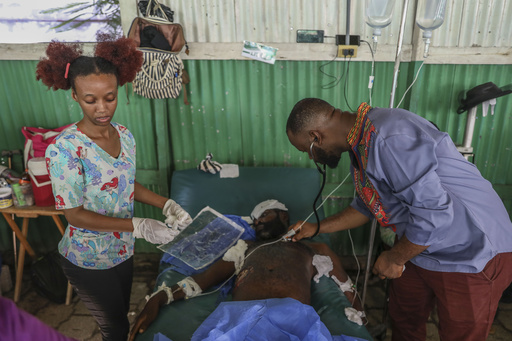
PORT-AU-PRINCE, Haiti — A staggering total of over 1,740 individuals were killed or injured in Haiti between July and September, marking nearly a 30% rise compared to the previous three months, as disclosed by United Nations officials on Wednesday.
This escalation in violence coincides with the ongoing U.N.-supported initiative led by Kenyan police aimed at mitigating gang activity, which now dominates approximately 85% of Port-au-Prince. However, the efforts are hindered by insufficient funding and personnel, leading to increased calls for a full-scale U.N. peacekeeping mission.
The United Nations Integrated Office in Haiti, known as BINUH, issued a stark warning that in the absence of effective state governance, gangs have stepped into roles usually held by the police and judicial systems, imposing their own rules upon the population.
In the third trimester, the report tallied a tragic 1,223 homicides, primarily attributed to gang-related violence. In addition to this, law enforcement officials are accused of at least 106 extrajudicial killings, which included victims as young as 10, who were suspected of providing information to gangs.
According to BINUH, 96 of these extrajudicial killings were executed by police officers, while 10 other individuals were reportedly involved under the direction of Jean Ernest Muscadin, the public prosecutor for Miragoâne, a coastal city in the south. Muscadin has been accused of the deaths of at least 36 individuals suspected of gang involvement or other criminal activities since 2022.
Efforts to secure comments from Haiti’s National Police went unanswered, and Muscadin terminated the call when contacted for a statement.
The report further indicated that at least 669 of the casualties during this trimester resulted from police-led operations against gangs, with approximately 75% of these victims identified as gang members and 25% as innocent civilians. “The information gathered suggests a potential overuse of lethal force and a lack of necessary precautions to safeguard the public during these operations,” BINUH noted.
When comparing the figures, the number of casualties from July to September experienced a 27% uptick against the previous trimester, yet it marked a 32% decrease in relation to the first trimester of the year.
Most incidents — totaling 234 killings and injuries — took place within the La Saline slum of Port-au-Prince, primarily occurring inside locals’ makeshift homes as gangs struggle for dominance over Haiti’s major port and its container terminal.
The report also highlighted recent gang activities in the Carrefour and Gressier regions near Port-au-Prince, where extreme violence was employed to assert control over residents. In one particularly brutal incident in mid-August, a plainclothes policeman was captured, mutilated, and ultimately burned alive at the hands of gang members.
Self-defense groups have also surfaced, being responsible for at least 122 killings aimed at suspected gang members or individuals accused of crimes like theft. Victims endured gruesome fates, including mutilation with machetes, stoning, decapitation, burning alive, or burial while still alive, with children among those targeted.
By the end of the third trimester, at least 59 children had been reported killed or injured amidst the violence.
The majority of these violent acts continue to plague Port-au-Prince and the central Artibonite region, where earlier this month, a massacre resulted in numerous fatalities.
On a slightly positive note, kidnappings saw a significant drop, with reports indicating 170 cases in the third trimester compared to earlier numbers, with over 60% of those incidents originating from Artibonite.
Conversely, sexual violence remains alarmingly prevalent, with at least 55 recorded cases of gang rape, affecting girls and women aged between 10 and 70 years. BINUH noted that many of these incidents go unreported, with women and girls frequently assaulted in their homes or as they travel on foot or public transport. Some have reported being subjected to sexual exploitation for extended periods by gang members.
Gang-related violence has rendered over 700,000 individuals homeless in recent years, and the situation intensified this month as armed groups made attempts to seize control of Solino, one of the last neighborhoods in Port-au-Prince to remain outside gang dominance.
